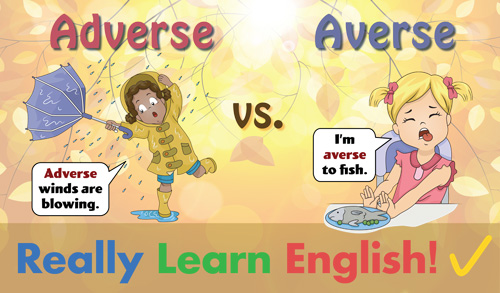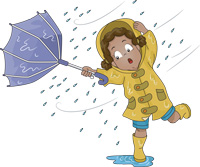Adverse vs. Averse
What is the difference?
Two words in English that are often confused by learners are adverse and averse. They are easy to mix up since there is only a one letter difference between the two words, and they also sound almost the same.
It is very important that you know which is which though, because their meanings are not the same. One means to really dislike something, while the other means that something is difficult or challenging. The definitions are even a little similar, but the difference is very important!

Let's go over each word and take a look at some examples to help you get a better idea of when to use adverse or averse.
Click Here for Step-by-Step Rules, Stories and Exercises to Practice All English Tenses
Adverse
The first word to know is adverse, which is always an adjective.
Adverse has basically two definitions, so it should not be too hard to remember. It can mean that something makes things more difficult for you, or is in the way of what you want.

It can also just mean that something is opposite to another thing.

Let's go through some specific examples so that you can get a better idea of when you can use adverse in a sentence.
Examples:
- I overcame many adverse circumstances to become the mayor.
(I overcame circumstances that made it harder for me to succeed, and became the mayor.)

- Mark and Laura act adversely toward one another, so they do not work together anymore.
(Mark and Laura do things to make life harder for one another, so they do not work together anymore.)

- Because of adverse winds, it took Scott twice as long to sail home as it should have.
(Because of winds blowing in the opposite direction that Scott was sailing, it took him twice as long to get home.)

- I do not support the war because it is adverse to my beliefs.
(I do not support the war because it is against my beliefs.)

- The new review of his book is full of adverse criticism.
(The new review of his book is full of criticism that is very much against it.)

Averse
Our second word is averse, which is spelled almost the same, but it has no "d" in it. Averse is also an adjective and has only one definition.
Averse means that you strongly dislike or are against something.

This word is often written or said along with the preposition "to." You would say that you are "averse to" something. It is also alright to say "averse from," but this is not said very much anymore.
Now let's see some specific examples of averse used in sentences!
Examples:
- I do not eat salad because I am averse to lettuce and most other vegetables.
(I do not eat salad, because I have a strong dislike for lettuce and most other vegetables.)

- Max is not averse to mowing the lawn.
(Max does not dislike mowing the lawn.)

- She tells me that she feels strongly averse to doing the homework.
(She tells me that she feels like she really does not want to do the homework.)

- I am averse from committing any crimes.
(I do not want to commit any crimes.)

- My cat is not averse to napping all day long.
(My cat is happy to nap all day long.)

More Tips
So now that you know that adverse means that something is difficult or is an obstacle to your success, and that averse means that you really do not like something.
Since each one only has one definition, it should be pretty easy to remember which one is which, but since the two words sound so much alike and are almost spelled the same, here's another tip you can use to tell the difference.
Adverse is spelled just like averse except that it has a "d" in it after the "a." If you are having trouble remembering, just think that ad, like at the beginning of adverse, sounds like add, and if something is adverse then it adds difficulty and makes things harder.
Now if you ever have trouble figuring out which is which, just remember that little trick and you should have no problem!

A Story to Practice Adverse vs. Averse
I walk to school on a very stormy day. It is hard to walk down the street because of adverse winds blowing me backward the whole time. I feel averse to this bad weather because it makes me late to school. I get to class and the teacher says she is averse to me coming in late. I tell her of the adverse conditions that I had to deal with in order to get to school, but she is also averse to listening and sends me to the principal.
The principal says that coming to school late is adversely impacting my grades and that he is not averse to giving me detention. I am averse to detention though, because it is adverse to my plan to go to the movies with my friends after school!

Quiz
Answer the following 10 questions and then check your answers. Each question is worth 10 points.
Part 1:
- Which of the following is a correct definition of adverse?
- Together
- Opposite
- Without
- To dislike very much
- Which of the following is a correct definition of averse?
- To enjoy
- To be in the way
- To not like something
- To fight with
- Which sentence is written correctly?
- He is averse to green foods.
- I am adverse to playing sports.
- There are many averse obstacles in your way.
- An averse wind carried the boat out to sea.
- Which of the following is written incorrectly?
- My mother is averse to junk food.
- His decision had an adverse impact.
- I am not adverse to going fishing today.
- The children will be affected adversely.
Part 2:
- She is _____ to sleeping on the floor.
- Adversly
- Aversing
- Adverse
- Averse
- The rules are unfair because they affect one team _____.
- Adversely
- Averse
- Adverse
- Aversed
- Lisa and Ruth have an _____ relationship.
- Aversely
- Adverse
- Adversely
- Averse
- The dog is not _____ to a big juicy steak.
- Adverse
- Adversely
- Adversing
- Averse
- I turn around and walk in the _____ direction.
- Aversing
- Averse
- Adverse
- Adversing
- There is no one who is _____ to kittens.
- Averse
- Adverse
- Adversely
- Aversed
Answer Key
Part 1: 1. B | 2. C | 3. A | 4. C
Part 2: 1. D | 2. A | 3. B | 4. D | 5. C | 6. A
Get Updates, Special Offers, and English Resources
Download your FREE GIFT (the first two chapters of
English Short Stories Book and Workbook)
as soon as you join!

By submitting your email, you consent to receiving updates and newsletters from us and to the sharing of your personal data with third parties for the purposes of sending you communications. We will not spam you. You can unsubscribe at any time. For more information, please see our privacy policy.
Return from Adverse vs. Averse to
Confusing Words and Some Common Mistakes in English








